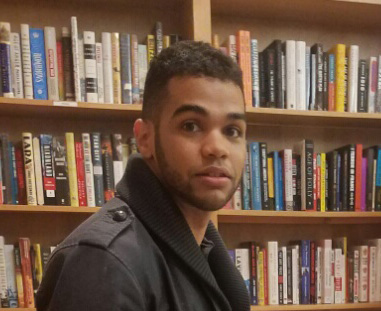Rain and the Designs of Your Body
by J.M. Guzman
Edited by Julia Rios
Copyedited by Chelle Parker
November 2018
Before we muted ourselves, Julio went to show me the skin of his spine. He unwrapped himself: a jacket off, a cardigan peeled. At the time, I didn’t realize we were losing our voices.
Julio slipped off his shirt and showed me a lake. It stirred, a puddle settling in the landmass that was once his back. Brown skin watered down, an indigo bruise.
“Is that… a tattoo? Is it new?”
He smiled. “It’s growing.”
“I don’t know what that means.”
“Well, Nat,” he said, smiling with a cracked face, an expression of wistfulness. A premonition, maybe. That old, familiar conjuring of an end. “It’s not a tattoo. This is just what happens.”
“Does it hurt?”
“I guess it’s going to stay hurting,” Julio said, showing me the way he was being consumed — in words. There was nothing to say back, no spell to unbind the night. The curtain was undone, collecting on the floor, unraveling endlessly. Can curtains unravel? I don’t even know anymore.
Maybe there’s just not much to know.
After everything, there is only one truth left in this storm:
I visited the lake four times.
The second visit cradled me with a lie.
I shouldn’t tell you this. But it has become a pattern, you know? The spraining of my body, this afterimage of pain stretching between us.
Julio is our backdrop. He is what makes us post-apocalyptic. But here:
I was in his room. No light crashed through the window. Instead, it was a world framed by the TV flash. And Julio’s back was an archipelago. The world being washed away, continents submerged, wet shoes filling in the dark.
“Are you okay?”
Julio didn’t respond. He just smiled. It was the most obvious illusion I had ever seen. But there was something else. I noticed the mask he wore was too thick for his face, too wide, forever uneven.
But that was the moment I learned how to pretend to be okay. And that pretending was a kind of love, a sort of sacrifice. A gesture for those who could not bear to see flesh opening to reveal black bones.
I didn’t press him. But we knew, then. What distance tasted like.
We lost more words in every encounter. And in between each visit was something growing.
No, you won’t understand.
After I realized that his floor was dark, Julio asked me, “Are we okay?”
There was a pause before my answer. “Yeah,” I said.
Two weeks later, I changed my mind.
A lake needs criteria to make the small of your back a home.
Julio said there were three things on my third visit to his lake. And three is ritual, una brujería; three is the number that brings us to the most local legend, the sentimental ending.
Naked with his hands quaking, wet spine to my face, Julio named a trinity:
Hurt soil.
Recognition of rain.
Disconnection from land.
And it all made sense. All the times I have drowned in him.
So I tried to ask Julio…What does it feel like when it rains? Do you grow? Overflow?
But I didn’t. Instead, I said, “I would still like to be friends.”
“I think,” he started, “you should reach inside my back.”
“Why?”
“To see what you can pull out.”
The floor was wet. The walls were crying. Julio turned his face to me, brown eyes drier than my throat.
“I’m sorry,” I said.
“For what?”
“That you’re like this,” I finished.
And Julio walked to the television. Its face was cracked. “You are part of the reason I feel this way.”
“I’m not responsible for how you feel.”
My clothes were tangled together on the floor.
“Or for how your body reacts,” I continued.
And he started crying. But he smiled, too. “Yeah.”
Julio and I anchored ourselves in each other, slicing through river depth into an underwater dark.
One more visit. One more thing to tell you. Remember what it was like to realize you couldn’t swim? Thrashing, desperation. A heartbeat flooded with the song of splashing. And only silence left, a stone leaving the surface to join the night.
“I don’t owe you anything,” I said.
“No one owes anyone anything. You can do whatever you want but don’t sit here for one second and pretend that you’re not responsible for the things you do and say.”
“You need to take care of yourself.”
“I feel like you’re not understanding me. Like we’re not even having the same conversation. And maybe I’m explaining myself all wrong. Because of course I need to take care of myself. But does that justify you being so… I don’t know. Insensitive. Uncaring. Whatever,” Julio paused. “Maybe you’re right.”
The lake became an ocean, collapsing the continent of his torso into moss green. A wavering infection climbing across his clavicle, spreading into a coarse stretch of beard.
“I’m sorry you feel this way.”
“It’s so easy to say that.”
And I had nothing else. No other words. But in that second I thought of his sentences, the reality of our tension.
In time, he would become just a lake. The sea.
Something to visit.
Julio didn’t say it in quite these words, but I knew he was thinking of jumping.
“I hope you’ll be okay.”
“I’m sure,” he finished.
I don’t believe you, he said, in a world where we were transparent.
I don’t know what else to say, I said, in a space where I caught the right words.
Instead?
The void spills into my hand. And for a second, I steady myself, but it doesn’t take long for me to recoil. I told you, darling.
I don’t know what to do when it rains.
